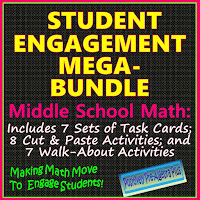Thank you to everyone who entered!
Monday, November 28, 2016
Sunday, November 27, 2016
TPT Cybersale Giveaway!!
Time to stock up on your holiday savings and get a head start on new ideas for your classroom in 2017!
I'm a big believer in keeping it simple - just comment below with your email address for your chance to win one of five prizes.
Everything in my store will be 28% off, so shop for everything you need for your classroom.
Happy teaching and happy holidays!!
Sunday, November 20, 2016
Parent Communication
I
may be one of the middle school teachers you hate (and I’m sorry for
that). Yes, I communicate with parents
on a regular basis – weekly to be exact.
Why do I do this you ask??
Honestly? I started doing it because it was something I
really wanted and longed for when my child was in middle school. Let’s face it, middle school is scary for
kids, for parents, and many days for teachers too. Parents no longer trust one adult with their
precious child. They’re expected to put
them on a bus or drop them off and let these little people navigate their way
through a school day with six or seven teachers telling them six or seven different ways to
do something. It’s tough for parents to
be out of the loop, but frustrating for all parties when things don’t go
right. These kids are too old to be
babied, but too young to be in charge of it all. So a weekly email to my parents letting them
know what's going on in math class seemed like a great idea.
The
big surprise was that the great idea to help parents and kids have a better
week actually ended up being the best thing I ever did to ensure I had a better
week too. It saves me time, energy,
angst, and sometimes I get a little good will in the process. It wasn’t the goal, but we teachers need all
the help we can get, so I’m spreading the news.
I rarely start my days anymore with angry emails about assignments not
done, failed tests, deadlines missed, supplies missing, or the excuse of the
day for why homework was not done. I
have found that parents truly want to help their kids step up to the new
responsibilities and accept the consequences as long as they know the
expectations were clearly given and they had an opportunity to help remind
them.
My
emails are not long or fancy. Nobody has
time for that. I may share something
that went well or was fun the prior week before outlining the plan for the
upcoming week, list out homework assignments, tutoring schedule, and important
upcoming assessment dates. If special
supplies are needed in class, I try to give them a week or two notice of
it. Personally I spent too many evenings
running to Walmart after a full day of work to get supplies that my kid forgot
to tell me they needed (before I learned that having a supply of poster boards,
markers, glue, etc. was a necessity for all homes with secondary
students). I don’t expect parents to
reply to my emails, but am happy if they do.
I
hear the most positive feedback from parents about the emails at
conferences. Our school does team
conferences, so if the parent is meeting with one teacher we all attend. We have found that problems are rarely
limited to one classroom and it’s best to meet together with the parent and come
up with a plan together. Maybe it is
the nature of the conferences, but parents typically are extremely thankful for
the communications and feel it makes their lives easier too.
That’s
a win-win we can all be happy with. The
hardest part is typing in all the email addresses, but the benefits are well
worth it. Last year our guidance counselors
asked to be added to my email list. They
told me it makes their job easier too. Communication. It may be the magic key to surviving middle
school for all of us!
Happy
teaching!!
Monday, November 7, 2016
Get Your Students Moving, Motivated & Learning!
Kids
fidget, wiggle, daydream, and lose focus.
It’s a fact of life and it doesn’t seem to matter if they are elementary
or secondary students, they all do it.
Let’s be honest for a second.
When we, as adults, are asked to sit and focus for an extended period of
time we too fidget, wiggle, daydream, and lose focus. Let’s look at some ideas for increasing
student focus and helping everyone learn more.
1. Put
them in groups. I
know, but our students are social beings.
They learn as much, if not more, from their peers as they do us. Let them talk math. Let them express different ways to solve
problems. Let each group come up with
multiple representations, and most important, let them present their work to
the class. Before you do this remember
to establish clear rules, boundaries, and expectations – then stick to them!
2. Get
them out of their seats. Very
few have mastered the skill of sleeping while standing. Have activities that get them out of those
seats and moving around the classroom or around campus. Nice day?
Go outside. My kids still talk
about the picnic table lesson. We moved
outside because of very loud, very high pitched noises coming from the
intercom, but they don’t remember that part.
Scavenger hunts, walk-abouts, and rotation stations are great additions
to any classroom.
3. Brain
breaks. It
might seem like the 2016 buzz word, but brain breaks have been around for a
long time. If students have been working
at one task for a sustained period of time, they need to stop, take a break,
and refocus. There are a million and one
ideas out there for brain breaks, but you don’t need to go fancy. Tell those kids to get up and shake it, put
on a funny video clip, play Simon says, switch seats, or anything that appeals
to your students. In the past my
students have done the chicken dance and sang the polygon song. Yep, they are middle schoolers but lucky for
me they can be silly too.
4. Have
students set goals. I
discovered the power of this activity when “writing in math” became mandatory a
few years ago in my district. Every
quarter students had to write about something math related. For the first assignment I had them write
about their goals in math for the year and was surprised at how much thought went
into the assignment. They kept a copy of
their goals and we checked back every quarter (it wasn’t part of the other writing
assignments). Those goals became very
real for them and I found they worked hard to achieve them before the year
ended. It also provided encouragement
along the way that they were growing in their math knowledge.
These
are just a few ideas, but I hope you can use them in your classroom. I’d love to hear what ideas you use for
moving and motivating your students to increase learning.
 |
 https://www.teacherspayteachers.com/Product/Student-Engagement-Activities-Mega-Bundle-for-Middle-School-Math-2679833 https://www.teacherspayteachers.com/Product/Student-Engagement-Activities-Mega-Bundle-for-Middle-School-Math-2679833 |
Happy
teaching!!
Subscribe to:
Comments (Atom)














